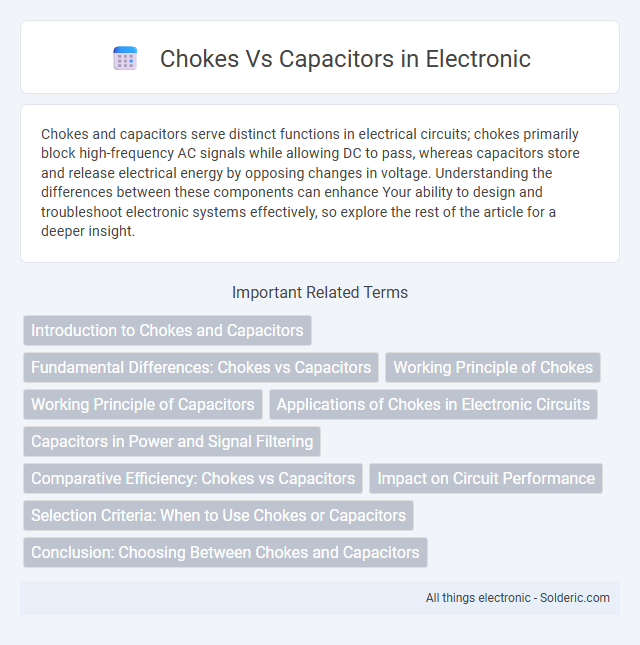Chokes and capacitors serve distinct functions in electrical circuits; chokes primarily block high-frequency AC signals while allowing DC to pass, whereas capacitors store and release electrical energy by opposing changes in voltage. Understanding the differences between these components can enhance Your ability to design and troubleshoot electronic systems effectively, so explore the rest of the article for a deeper insight.
Comparison Table
| Feature | Chokes (Inductors) | Capacitors |
|---|---|---|
| Function | Store energy in magnetic field, block high-frequency AC | Store energy in electric field, block DC |
| Impedance | Increases with frequency (Z = 2pfL) | Decreases with frequency (Z = 1 / 2pfC) |
| Typical Use | Filter noise, smooth current, RF chokes | Coupling, decoupling, filtering, energy storage |
| Symbol | Coil/Inductor symbol | Two parallel lines (||) |
| Construction | Wire wound on core (air, iron, ferrite) | Two conductive plates separated by dielectric |
| Energy Storage | Magnetic field | Electric field |
| Behavior in DC Circuit | Acts as short circuit (low resistance) | Acts as open circuit (no current flow) |
| Frequency Range | Effective at high frequencies for blocking | Effective across a broad frequency spectrum |
| Applications | Power supplies, RF circuits, EMI filters | Signal coupling, timing circuits, smoothing |
Introduction to Chokes and Capacitors
Chokes and capacitors are essential components in electrical circuits, each serving distinct roles in managing current and voltage. Chokes, or inductors, resist changes in current by storing energy in a magnetic field, making them crucial for filtering and noise reduction in power supplies. Capacitors store energy in an electric field and regulate voltage fluctuations by releasing or absorbing charge, which stabilizes your circuit's performance.
Fundamental Differences: Chokes vs Capacitors
Chokes and capacitors serve fundamentally different roles in electrical circuits, with chokes acting as inductors that resist changes in current by storing energy in a magnetic field, while capacitors store energy in an electric field and resist changes in voltage. Chokes are primarily used for filtering high-frequency noise and smoothing current flow, whereas capacitors are crucial for filtering voltage, coupling signals, and stabilizing power supplies. Understanding these core differences enables you to select the right component for managing energy storage, signal filtering, or power conditioning in your electronic designs.
Working Principle of Chokes
Chokes function by storing energy in a magnetic field created by the current flowing through their coil, which opposes sudden changes in current. They act as inductors, presenting high impedance to alternating current (AC) while allowing direct current (DC) to pass with minimal resistance. This property makes chokes essential in filtering circuits to block high-frequency noise and stabilize current flow.
Working Principle of Capacitors
Capacitors store electrical energy by accumulating opposite charges on two conductive plates separated by an insulating dielectric material, creating an electric field. When voltage is applied, they allow alternating current (AC) to pass through by continuously charging and discharging, while blocking direct current (DC). This energy storage and release mechanism in capacitors contrasts with chokes, which oppose changes in current by storing energy in a magnetic field.
Applications of Chokes in Electronic Circuits
Chokes are primarily used in electronic circuits for filtering high-frequency noise and preventing electromagnetic interference (EMI) in power supplies, audio equipment, and radio frequency (RF) applications. Their ability to store energy in a magnetic field helps stabilize current flow and smooth voltage fluctuations in DC power filtering and signal conditioning circuits. Common applications include EMI suppression in switch-mode power supplies, RF chokes in antenna systems, and inductive noise filtering in audio amplifiers.
Capacitors in Power and Signal Filtering
Capacitors play a crucial role in power and signal filtering by storing and releasing energy to smooth voltage fluctuations and reduce noise in electronic circuits. They effectively block direct current (DC) while allowing alternating current (AC) to pass, which helps stabilize power supply lines and enhance signal integrity. In comparison to chokes, capacitors provide faster response times for filtering high-frequency noise and ripple in both power and communication systems.
Comparative Efficiency: Chokes vs Capacitors
Chokes exhibit superior efficiency in filtering high-frequency noise due to their inductive properties, which impede rapid current changes more effectively than capacitors. Capacitors excel at storing and releasing energy rapidly, offering lower impedance at higher frequencies for smoothing voltage fluctuations. In power supply applications, chokes provide consistent noise suppression with minimal energy loss, while capacitors contribute to transient response and power factor correction, making their combined use essential for optimal circuit performance.
Impact on Circuit Performance
Chokes and capacitors significantly influence circuit performance through their distinct roles in filtering and signal conditioning. Chokes, or inductors, primarily suppress high-frequency noise by impeding rapid current changes, enhancing signal integrity in power supplies and RF circuits. Capacitors store and release energy quickly, smoothing voltage fluctuations and stabilizing power delivery by filtering out low-frequency noise and ripple in various electronic applications.
Selection Criteria: When to Use Chokes or Capacitors
Chokes are ideal for filtering low-frequency noise and managing high-current applications due to their inductive properties, while capacitors excel at blocking DC and bypassing high-frequency noise in circuits. Use chokes when you need to smooth power supply signals or limit current spikes, and select capacitors to stabilize voltage and filter out electromagnetic interference at higher frequencies. Your choice depends on the specific frequency range and current requirements of your electronic design.
Conclusion: Choosing Between Chokes and Capacitors
Chokes and capacitors serve distinct roles in electrical circuits, with chokes primarily filtering high-frequency noise and capacitors managing energy storage and voltage smoothing. Your choice depends on the specific application requirements, such as whether you need to block AC signals or store charge for power stabilization. Understanding the electrical characteristics and circuit demands ensures optimal performance when selecting between these components.
chokes vs capacitors Infographic

 solderic.com
solderic.com